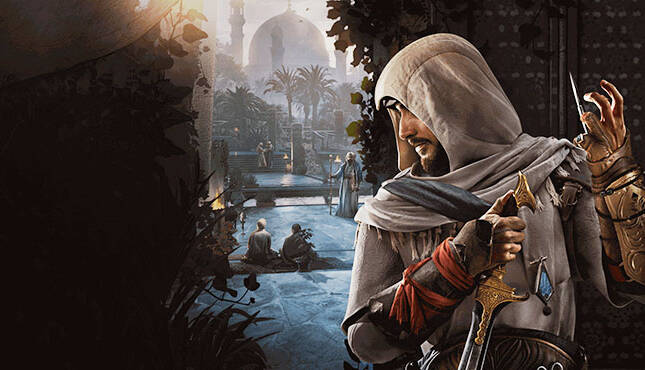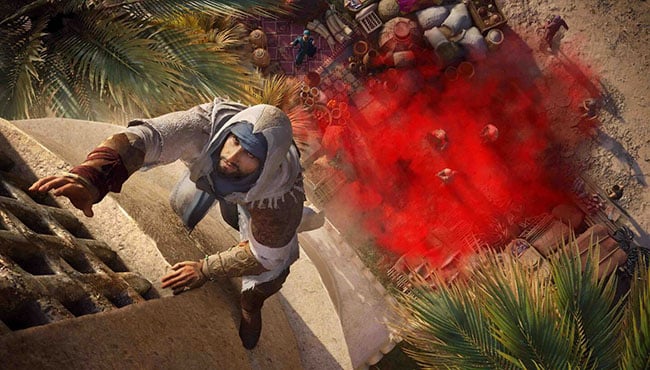games / Reviews
Assassin’s Creed Mirage (PS5) Review
 Image Credit: Ubisoft Entertainment
Image Credit: Ubisoft Entertainment
Around these parts, I guess I’m considered the Assassin’s Creed guy. While I haven’t played every spin-off or ancillary title in the franchise, I have played all the main ones from AC2 to Mirage and while the series quality has generally been decent, certain games have vacillated in quality quite a bit. Mirage takes an interesting approach though that I’m really not quite sure is for everyone.
Assassin’s Creed Mirage takes place during the 9th century in the city of Baghdad where you play as a street thief/newly minted Hidden One (Assassin) Basim. If you played the last game, Basim was in that also but as a secondary antagonist to the present day storyline. Here though, he is the protagonist of the game, which is basically his origin story. It’s very much in the guise of “What if Aladdin joined the Assassins?” and then got around to murdering a bunch of people.
In Baghdad you are generally tasked with stopping the Order of the Ancients (Templars) from their corruptive influence on the Caliphate (religious government) and their goals to unlocking more of the First People’s technology. If you’ve played prior Assassin’s Creed games, you generally know the score here.
Compared to the last few AC games, Origins/Odyssey/Valhalla, Mirage is almost a complete throwback to the older style games in the franchise. There’s no RPG mechanics, no Brotherhood mechanics, no sprawling upgrade/skill tree, no town/homestead upgrading stuff, no hunting, or really crafting to speak of, etc. If anything, this game feels like Assassin’s Creed 1.5. Assassin’s Creed 2 had more going on, from a gameplay perspective, than Mirage does and to me, that is frankly weird.
So what is missing here from even Assassin’s Creed 2, let alone the later entries in the series? Well, for one, there’s no building/town improvements or economy to really speak of. There is something you can do to lower merchant prices, which I’ll get into below, but there’s no Villa/Homestead/Boat/Train equivalent here at all. Another thing that is missing is hidden tombs/crypts, or anything that actually involves thinking/parkour. Another lacking item is side missions/content. To be clear, this game DOES have some side missions, but I think there are a total of 4 “Tales of Baghdad” that have voice acting and a bit of actual story but that is it. There are also about 15 or 20 general assassination contracts for you to fulfill, but those typically boil down to either killing enemies, rescuing people, or stealing something. These contracts do have an added bonus objective which might require you to be stealthier, not kill anyone, or do a specific kill against a target which nets you a few more money, resources or reward tokens.
One of the new systems in the game is the token system and I’m a bit bewildered by it. In past AC games, you would come upon bands of thieves, mercenaries, courtesans, etc., and could hire them with money to distract guards, fight for you and so on. Here, instead, there is a new “Favor Token” system that has you dealing with three token types: Scholar, Power and Merchant to use. Scholar tokens are used for hiring certain crowds to hide in, to hire musicians to distract guards and a few quests need some tokens to complete. You also use Scholar tokens to buy maps from the cartographer merchant. Power tokens are used for hiring mercenaries to fight for you or to bribe certain guards to get you into places. Merchant tokens are used to reduce the merchant prices, by up to 30%, to open certain chests, and to buy off people during some quests as well.
My question is: why is ANY of this needed? What was so wrong with just using the gold/money currency from before? I mean, at least the treasure maps from the cartographer aren’t tied to real-money microtransactions but it just seems like a weirdly cumbersome system that is replacing something that worked in a simple but elegant way from before.
There are two other big/new gameplay systems in Mirage that I should address. The first is the “Assassin’s Focus” system. During the game, you gain the ability to freeze time and highlight two targets for you to execute in rapid succession, while in stealth. You can eventually increase the focus number up to five, so you can eliminate up to five enemies at once, with Basim teleporting around the area, based on what enemies you targeted. To refill the spent focus points, you need to then eliminate other enemies in stealthy ways. While this system hasn’t been in an Assassin’s Creed game before it has been in other Ubisoft games, specifically the last two Splinter Cell games, only in those games they called it the “Mark and Execute” system.
Lastly, there are occasional big poles to cross bigger gaps with on the roofs and also street level scaffolds you can collapse to stop enemy pursuers. This is the second big addition. THIS IS IT!

There is a skill tree for Basim to upgrade his abilities but it’s all tied to story/side mission progression. You don’t get 50 experience points for a kill or anything, certain missions just dole out points and you allocate them in either the combat tree, the tools tree, or the bird tree. Each tree has about 8 or 9 skills to unlock with the later ones requiring more points. Some skills are fairly useful, especially in the tools tree but the bird tree is fairly pointless, and combat in this game is a joke.
Instead of AC2’s graceful combat system, the combat in Mirage is extremely basic. You have a light attack or can hold the button to do a heavier attack, which costs stamina. It also costs stamina to dodge enemy attacks. There are only four enemy types in the game: regular soldier, armored soldier, flame soldier and “Shakiriyyas”. Regular soldiers (either with swords or shields) you can just wail on, same with the flame guys, just avoid their flame attacks. The heavy soldiers almost exclusively do heavy attacks, which you can’t counter, so just dodge them and start cutting up their backs. The “Shakiriyyas” enemies are the elite soldiers that only come out when you are at a high notoriety. You can’t assassinate them while hidden, you only damage them. These enemies are tough but they do throw in plenty of light attacks, which is the attack type you can counter, so they aren’t too hard to beat down, if you have some health items.
You can upgrade Basim’s weapons, outfit and tools with resources you collect also, components, steel, and leather. You get resources from treasure chests or by doing missions but I was usually hurting for components, which is the main resource for upgrading your tools. My tip? Lower the merchant prices by 30% and just routinely buy all the components they have. It’ll save you some frustration later on. The weapon/armor upgrades are just passive bonuses, like slightly increasing attack/defense, or making the perks better but the tool upgrades are what to focus on. You have five assassins’ tools from throwing darts, to a blowgun, traps, noisemakers, and a smoke bomb. These all can be upgraded in various ways to make them more lethal, or effective, or quieter, depending on your preference. You just unlock the upgrade slot at the hideout and then can freely pick a new upgrade, or can pick another option at any time, if you want. Almost all of this stuff is recycled from past AC games, like the blowgun or smoke bomb. One of the blowgun upgrades turns the enemy against one another but it barely worked half the time I used it. About 40% of the time, I would hit an enemy with it and they would just stand there and not do anything. That was pretty cool.
The last point I’ll bring up in this review is that I keep coming back to the question of “Why?”. Why does this game exist? Why is it focused on Basim, who is a complete nothing of a character? Why isn’t the game focused on Shohreh Aghdashloo’s character? Outside of a brief intro video with William Miles, why isn’t there ANY present day stuff in this game at all? Like, there isn’t even the pretense of the Animus or anything in this game, what was the reasoning behind that? If the entire game is just trying to justify Basim as this all-important new character, it largely falls on its face. There is a plot twist in the game that is, on the surface, kind of interesting, but the more you think about it, the bigger problems kind of crop up about it.









